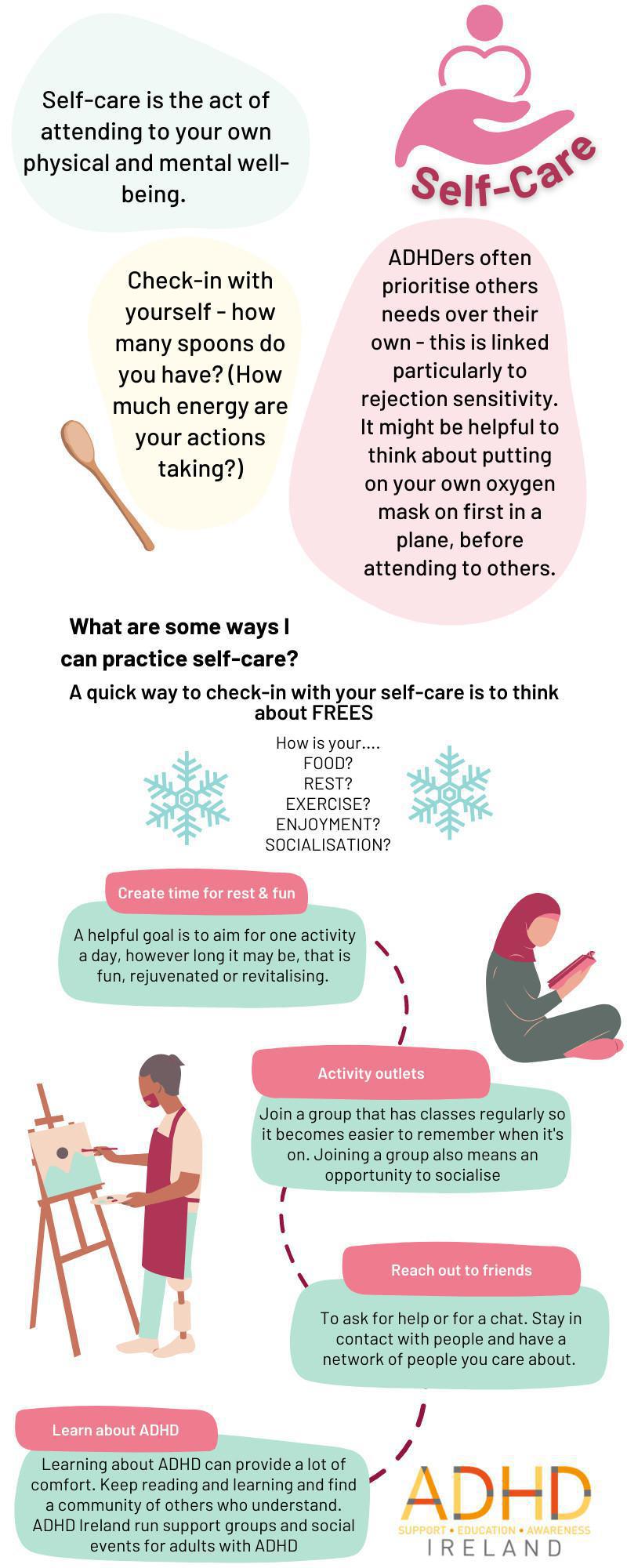What is self-care?
- Self-care is the act of attending to your own physical and mental wellbeing and is a really important part of minding yourself.
- Adults with ADHD often experience more stress and anxiety than someone without ADHD and are less likely to engage in self-care and have unhealthy coping strategies (like avoiding the problem or lashing out), so it’s really important to make an effort to mind your physical and mental wellbeing.
- Self-care is about making the time to do things that make you happy.
What are some ways I can practice self-care?
- Prioritise your hobbies. Organisation is a big challenge for people with ADHD so it's really important that when you work out a plan to manage your time effectively, you make sure there's time for your hobbies somewhere in your week. The same goes for scheduling time to relax, whatever that looks like for you!
- Activity outlets (like sports or something that gets you moving) are really helpful for peopel with ADHD. It's great to join a group that has classes regularly, so it becomes part of your schedule. Doing it as a group also means an opportunity to socialise and commit to the activity.
- Make an effort to reach out to friends, asking for help or just for a chat. Staying in contact with people and having a network of people you care about is really important. Create a list of people who support you and make note of is in the My Support Contacts page. This will be helpful on days you might feel lonely or isolated.
- Learning about ADHD can provide a lot of comfort. Reading this App and other bibliotherapy options, like books or blogs, can give you other techniques. Finding a community can offer huge support. Check out ADHD Ireland for more information, as they run support groups and social events for adults with ADHD.
References
Abd El Baaki, O. M., Abd El Hamid, E. R., Zaki, S. T., Alwakkad, A. S. E. D., Sabry, R. N., & Elsheikh, E. M. (2021). Diet modification impact on ADHD outcome. Bulletin of the National Research Centre, 45(1), 15. https://doi.org/10.1186/s42269-020-00466-x
Al-Yagon, M., Lachmi, M., & Shalev, L. (2020). Coping strategies among adults with ADHD: The mediational role of attachment relationship patterns. Research in Developmental Disabilities, 102, 103657. https://doi.org/10.1016/j.ridd.2020.103657
Bitter, I., Simon, V., Bálint, S., Mészáros, Á., & Czobor, P. (2010). How do different diagnostic criteria, age and gender affect the prevalence of attention deficit hyperactivity disorder in adults? An epidemiological study in a Hungarian community sample. European Archives of Psychiatry and Clinical Neuroscience, 260(4), 287–296. https://doi.org/10.1007/s00406-009-0076-3
Bussing, R., Mason, D., Garvan, C. W., Gurnani, T., Koro-Ljungberg, M., Noguchi, K., & Albarracin, D. (2016). Willingness to use ADHD Self-Management: Mixed Methods Study of Perceptions by Adolescents and Parents. Journal of Child and Family Studies, 25(2), 562–573. https://doi.org/10.1007/s10826-015-0241-4
Cagigal, C., Silva, T., Jesus, M., & Silva, C. (2019). Does Diet Affect the Symptoms of ADHD? Current Pharmaceutical Biotechnology, 20(2), 130–136. https://doi.org/10.2174/1389201019666180925140733
Canela, C., Buadze, A., Dube, A., Eich, D., & Liebrenz, M. (2017). Skills and compensation strategies in adult ADHD – A qualitative study. PLOS ONE, 12(9), e0184964. https://doi.org/10.1371/journal.pone.0184964
Gutman, S. A., & Szczepanski, M. (2005). Adults with Attention Deficit Hyperactivity Disorder. Occupational Therapy in Mental Health, 21(2), 13–38. https://doi.org/10.1300/J004v21n02_02
Hensley, L. C., & Munn, K. J. (2020). The power of writing about procrastination: Journaling as a tool for change. Journal of Further and Higher Education, 44(10), 1450–1465. https://doi.org/10.1080/0309877X.2019.1702154
Hershko, S., Cortese, S., Ert, E., Aronis, A., Maeir, A., & Pollak, Y. (2020). The influence of attractiveness and convenience cues on food appeal in adults with and without ADHD. Appetite, 150, 104679. https://doi.org/10.1016/j.appet.2020.104679
Holahan, C. J., Ragan, J. D., & Moos, R. H. (2017). Stress☆. In Reference Module in Neuroscience and Biobehavioral Psychology. Elsevier. https://doi.org/10.1016/B978-0-12-809324-5.05724-2
Li, L., Taylor, M. J., Bälter, K., Kuja‐Halkola, R., Chen, Q., Hegvik, T.-A., Tate, A. E., Chang, Z., Arias‐Vásquez, A., Hartman, C. A., & Larsson, H. (2020). Attention-deficit/hyperactivity disorder symptoms and dietary habits in adulthood: A large population-based twin study in Sweden. American Journal of Medical Genetics Part B: Neuropsychiatric Genetics, 183(8), 475–485. https://doi.org/10.1002/ajmg.b.32825
Mohammadpour, N., Jazayeri, S., Tehrani-Doost, M., Djalali, M., Hosseini, M., Effatpanah, M., Davari-Ashtiani, R., & Karami, E. (2018). Effect of vitamin D supplementation as adjunctive therapy to methylphenidate on ADHD symptoms: A randomized, double blind, placebo-controlled trial. Nutritional Neuroscience, 21(3), 202–209. https://doi.org/10.1080/1028415X.2016.1262097
Wang, L.-J., Yu, Y.-H., Fu, M.-L., Yeh, W.-T., Hsu, J.-L., Yang, Y.-H., Yang, H.-T., Huang, S.-Y., Wei, I.-L., Chen, W. J., Chiang, B.-L., & Pan, W.-H. (2019). Dietary Profiles, Nutritional Biochemistry Status, and Attention-Deficit/Hyperactivity Disorder: Path Analysis for a Case-Control Study. Journal of Clinical Medicine, 8(5), 709. https://doi.org/10.3390/jcm8050709
Weissenberger, S., Ptacek, R., Vnukova, M., Raboch, J., Klicperova-Baker, M., Domkarova, L., & Goetz, M. (2018). ADHD and lifestyle habits in Czech adults, a national sample. Neuropsychiatric Disease and Treatment, 14, 293–299. https://doi.org/10.2147/NDT.S148921




